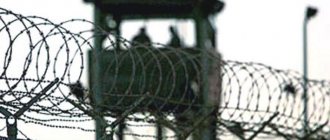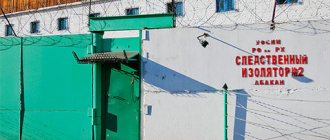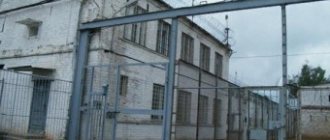1. Synonyms with string. 2. . 3. “Prison” sentences. 4. Meaning of the word. 5. Antonyms for “prison”. 6. Printing, . 7. Rhymes. 8. “Prison” associations. 9. Analysis of the composition of “prison”. 10. Find more synonyms by clicking on words.
| № | Synonym | Initial form | Frequency |
| 1 | cold (156) | cold | 119 |
| 2 | institution (102) | establishment | 80.4 |
| 3 | conclusion (140) | conclusion | 78.6 |
| 4 | Sailor's Silence (3) | 71.1952 | |
| 5 | academy (19) | academy | 70.3 |
| 6 | lock (55) | lock up, castle | 60.8 |
| 7 | Crosses (9) | cross | 56.4 |
| 8 | imprisonment (5) | 52.9706 | |
| 9 | place of detention (2) | 11.9583 | |
| 10 | Butyrka prison (2) | 10.5956 | |
| 11 | state house (5) | 9.1264 | |
| 12 | stone bag (7) | 8.45615 | |
| 13 | cellar (24) | cellar, bury | 8 |
| 14 | shipment (31) | shipment | 4.8 |
| 15 | places not so remote (5) | 4.647 | |
| 16 | dungeon (9) | dungeon | 3 |
| 17 | transit prison (2) | 2.74015 | |
| 18 | Butyrki (3) | Butyrki | 2.5 |
| 19 | dungeon (31) | dungeon | 2.5 |
| 20 | prisoner (10) | prisoner, prisoner | 2.1 |
| 21 | pawnshop (5) | pawnshop | 1.9 |
| 22 | casemate (10) | casemate | 1.8 |
| 23 | prison (24) | fort, prison | 1.8 |
| 24 | prison (5) | prison | 0.9 |
| 25 | central (3) | central | 0.9 |
| 26 | prison (13) | bullpen | 0.8 |
| 27 | kitcha (18) | kitsch | 0.8 |
| 28 | prison (7) | prison | 0.5 |
| 29 | jail (12) | prison | 0.4 |
| 30 | uncle's house (1) | 0.302 | |
| 31 | Bastille (2) | Bastille | — |
| 32 | penitentiary (2) | penitentiary | — |
| 33 | stage (2) | stage | — |
| 34 | special psychiatric prison (1) | special psychiatric prison | — |
| 35 | interior (4) | internal | — |
| 36 | zindan (4) | zindan | — |
| 37 | ergastul (1) | ergastul | — |
| 38 | Tyugulevka (1) | Tyugulevka | — |
| 39 | prison (1) | little jail | — |
| 40 | Chizhovka (2) | Chizhovka | — |
| 41 | trellis (1) | trellis | — |
| 42 | nichman (1) | worthless, worthless, worthless | — |
| 43 | terpiha (2) | terpih | — |
| 44 | kuchumka (1) | heap | — |
| 45 | Kichman (2) | kitschman, kitschmat, kitschmanny | — |
| 46 | plinth (5) | plinth | — |
| 47 | shackle (2) | shackled | — |
| 48 | oubliette (1) | oubliette | — |
| 49 | Rogachevka (1) | Rogachevka | — |
| 50 | yurtsy (1) | jurist | — |
| 51 | cover (3) | cover | — |
| 52 | tsyaptsyuh (1) | tsyaptsyukhiy | — |
| 53 | prisoner (2) | prisoner | — |
| 54 | pin (5) | pinned | — |
| 55 | flea beetle (9) | flea insect | — |
| 56 | political insulator (1) | political insulator | — |
| 57 | zugunder (5) | zugunder | — |
| 58 | Siberian (16) | Siberian | — |
| 59 | special prison (1) | special prison | — |
What is a prison and zone?
Firstly, in Russian colloquial language, the word “prison” refers to all places of deprivation of liberty. Secondly, camp and zone are synonyms. These two features create confusion for uninformed people, for whom both the prison and the colony appear in the imagination as damp and gloomy dungeons. But this, of course, is not true.
Pre-trial detention centers (SIZOs) are also called prisons, where suspects await the end of the investigation and the verdict of the court. There is more truth here. Although a pre-trial detention center cannot be a prison by definition, since people under investigation are imprisoned here, a pre-trial detention center and a prison are very similar in terms of conditions of detention. And these conditions, if not harsh, are very difficult.
A person in prison is deprived not only of freedom, but also freedom of movement. Most of the time (usually 23 hours) he sits in a cell. The walk lasts an hour, in a strictly designated and strictly guarded place, where even the sky is checkered.
What temporary temporary accommodation facilities are installed in the pre-trial detention center?
Find out what rights a person has when detained.
If you look at the zone in light of the above, it may seem like the opposite of a prison. But first you need to define the terms. The zone and camp are called correctional colonies (IK). The camp is a “legacy” of the Soviet Union.
In those days there were forced labor camps. The union no longer exists, as do the camps, but the term is used by inertia. In addition, it is not entirely convenient to use the official phrase “correctional colony” in colloquial speech - this is another reason why people use an outdated word.
The main difference between a zone and a prison is a softer regime of detention. There's a lot more freedom there. You can move around without an escort and your sentence is served not in cells, but in barracks (dormitories). You can go out of them and, for example, take a walk, albeit in a strictly defined sector. Moreover, you can work in the zone, there is a shop and even a club where cultural events are held.
To summarize, we can say that a colony is a prison settlement . Yes, they serve their sentences here, the prisoners are deservedly deprived of some rights, but at the same time they can lead a life, albeit remotely, but reminiscent of freedom.
But this does not mean that the colonies are good. In most cases, it is more humane than in prison, but the zones are different. Much depends on the population for which a particular correctional institution is intended. And not only from him. There are some other features that bring prisons closer to colonies and, on the contrary, make them different. Let's talk about them in more detail.
How are visits conducted in a pre-trial detention center?
Types of colonies
As we have seen, the main difference between a prison and a colony is the degree of freedom. But that's not all. Colonies, unlike prisons, are also divided by type of regime:
- strict;
- general;
- special;
- reinforced.
Convicts (men only) who have committed especially serious intentional crimes for the first time or for their relapse are sent to a maximum security colony. This is a closed type IR. In this place, living conditions are much harsher than in prisons.
Prisoners are led only in handcuffs, and they are prohibited from walking at full length; the walk lasts one hour. Limitations also apply to the number of visits, the money that the prisoner can spend on himself, and the number of parcels with transfers.
Special regime colonies are intended for those convicted of especially serious crimes and those who have committed a particularly serious recidivism. Hence the name. In these colonies there are also serving sentences for those whose execution was commuted to life imprisonment as a pardon.
Reference. The strict and special regime is very reminiscent of a prison. In these colonies, prisoners sit in locked cells for several dozen people. Those sentenced to life are held in cells of two, and sometimes in solitary confinement.
General regime correctional facilities are considered the most common type of correctional institutions , if only because they may contain:
- women;
- minors who were 18 years old at the time of sentencing;
- convicts who were transferred from educational colonies because they turned 21 years old.
Repeat offenders or people who have committed intentional serious crimes serve their sentences under the general regime.
There is much in common between general and reinforced security colonies. True, institutions of the second type contain those sentenced to life imprisonment. And the difference is only in fewer dates and “transfers”.
But in all correctional centers, in addition to the regime, there are also conditions of detention, they can be:
- strict;
- general;
- relieved.
What conditions a prisoner will be in depends on his behavior and attitude to work.
Colonial settlements stand apart from this list. These are not restricted areas. There are no paramilitary guards here - only the administration. With the permission of which, you can leave the colony and move outside of it without any supervision, you can also live here with your family. Such correctional facilities contain convicts (both women and men) who have committed crimes due to negligence, or crimes of light and medium gravity.
How long does quarantine last in prison?
Find out how to get compensation for unlawful detention by police officers.
A little about the Russian penal system
The penitentiary system, that is, the system of execution of punishments, in Russia is quite extensive. It includes:
- Colonies of various types. They differ both in the mode of detention and in the contingent. Colonies are correctional, educational and settlement.
- LIU and health care facilities. Patients with drug addiction, alcoholism, open form of tuberculosis, and so on serve their sentences in medical correctional institutions. They are there to monitor health, on an ongoing basis, which is why they differ from other health care facilities, that is, ordinary “hospitals” where medical care is provided to convicts.
- Prisons. Security institutions where prisoners are kept in cell-type premises and are not actually allowed to leave.
- Correctional centers. Institutions based on colonies or former special commandant's offices. Intended for serving a sentence in the form of forced labor.
- Pre-trial detention center. Pre-trial detention centers belonging to the system of the Ministry of Internal Affairs and the FSB. They hold prisoners in cell-type premises mainly during the investigation phase and while awaiting transport to the place of serving their sentence.
There is no concept of “zone” in the Criminal Code and the Penal Code (Criminal and Criminal Executive Code). Previously, this was the name given mainly to prison camps. Nowadays, zones are mainly called colonies.
What types of prisons are there?
Prisons, unlike colonies, are not divided into regimes, because in each of them two types of regime are a priori established:
- strict;
- general.
According to Article 130 of the Penal Code of the Russian Federation, convicts are immediately sent to a strict regime. They must spend at least a year here. Depending on how the convict shows himself - whether he will violate the established order or not - he will either be left on strict or transferred to general. This applies to all “inmates” of the correctional facility. Depending on their behavior, convicts can “move” from one regime to another and back.
Prisons house the most dangerous criminals, whom the law punishes and makes no attempt to correct. Therefore, in these places of deprivation of liberty, convicts are maximally isolated from the outside world.
Unlike camps, prison has one name and only two regimes. But nevertheless, in colloquial language the prison is called differently as:
- arrest house;
- Pre-trial detention center;
- SCHIZO.
Reference. The punishment cell (punishment cell) is located only on the territory of the penal colony. Malicious troublemakers are sent there. In a legal sense, these detention centers are not prisons, but this concept is quite applicable to them - the conditions of detention are similar to prison ones.
What is a prison?
A prison is understood as a closed penitentiary (correctional) type institution , where persons who have committed especially dangerous and serious crimes are kept in harsh conditions. This is an important element of the criminal justice system, the main functionality of which is to enforce a sentence of imprisonment.
In Russian prisons, the rights of citizens are severely limited. But this does not relieve them from performing their labor duties and complying with specially developed internal prison regulations. Otherwise, the punishment may be increased and conditions of detention may worsen.
Who gets there and why?
According to Part 7 of Art. 74 of the Penal Code of the Russian Federation, serving a sentence in prison is provided for:
- persons who are particularly dangerous repeat offenders (previously, such convicted persons were given the death penalty as the death penalty, but it has now been abolished, and such punishment is unlawful within the framework of existing legislation);
- citizens sentenced to imprisonment for five or more years for especially serious crimes;
- malicious violators of the disciplinary regime of serving their sentences, who were transferred here from correctional colonies.
Conditions of serving
In accordance with Article 131 of the Criminal Executive Code of the Russian Federation, imprisonment presupposes a number of special conditions for serving a sentence of imprisonment.
- Convicts live in shared cells that are locked from the outside (what do the cells look like?). In some cases, one of the prisoners may be placed in solitary confinement if there is an order from the prison authorities or a prosecutor's order. The cameras are under 24-hour security.
- According to Article 80 of the Penal Code of the Russian Federation, separate accommodation is provided for prisoners serving sentences under general and strict regime conditions. Also isolated from the rest of the prison population are persons who have been transferred from other correctional institutions or are preparing to be sent to another institution, as well as prisoners performing household duties.
- Daytime walks in the fresh air are allowed. For this purpose, the prison has a special area, which is under constant surveillance by the security service. If one of the prisoners violates the established rules during a walk, the prison management has the right to interrupt this event at its discretion.
Persons serving a prison sentence in a general regime have the right:
- spend on food products and basic necessities money earned while in prison or received to a personal account in the form of social payments in the amount of up to seven thousand rubles per month (according to Article 88 of the Penal Code of the Russian Federation);
- for two short and two long visits annually;
- to receive two parcels and two parcels annually;
- to exercise in open air space for two hours, and this time period can be increased by another half hour, provided that the prisoner conscientiously observes the established procedure.
Those sentenced to strict imprisonment are entitled to the following rights:
- spend on food and personal items funds earned in prison or that are part of social benefits and other sources of income contained in the citizen’s personal account in the amount of six thousand rubles monthly;
- during the year, arrange two short-term and one long-term dates;
- receive one parcel and one parcel per year;
- walk in the fresh air every day for one and a half hours, with the permission of the prison warden - two hours.
Particularly malicious violators of discipline and the established procedure for staying in prison are placed in a punishment cell - an isolated cell of a small area, as a rule, with poor living conditions (lack of sufficient heating, necessary furniture, etc.).
List and location in the Russian Federation
Currently, there are eight operating prisons in Russia, located in different regions of the country. These are the following establishments.
- OD 1/T-2 “Vladimir Central” (address: Vladimir, B. Nizhegorodskaya St., 67).
- Investigative prison YuU 323/ST-2 “Eletskaya krytka” (address: Yelets, Proletarskaya St., 16).
- USH 382/T prison (address: Balashov, Uralskaya St., 17).
- UE 148/T-4 prison (address: Chistopol, K. Liebknecht St., 1).
- YuI 78/ST-2 prison (address: Dimitrovgrad, Kalugina St., 66). Designed for 250 seats.
- YaV 48/T-1 prison for 1600 places in Verkhneuralsk.
- UP 288/T-4 prison for 400 places (address: Yeniseisk, Dekabristov St., 11).
- OE 256/T-1 prison (address: Vologda, Chernyshevsky St.).
What's the difference with a "zone"?
The term "zone" does not appear in official legal documentation and refers to the realm of colloquial speech. This word arose from the truncation of the names of individual parts of correctional institutions - “residential zone” and “industrial zone”. Most often, this word is used to describe all types of correctional colonies.
Conclusion
So, what is the difference between a zone and a prison? Prison and camp are correctional institutions. But with regard to the first, the legislation provides as a priority not correction, but punishment and prevention of future crimes. In prison, they sit in cells for 23 hours - there is only one thing to do - “serve” the term. That is, this is maximum isolation from the outside world, no freedom of movement.
Colonies are small villages. People there live in dormitories, are not locked with a key and have the opportunity to move around and even visit each other in other units. Also, convicts are provided with work, training, there are libraries and clubs. The prison houses dangerous criminals for whom there is minimal hope of reformation. In the colonies, all conditions have been created so that a person can improve.










